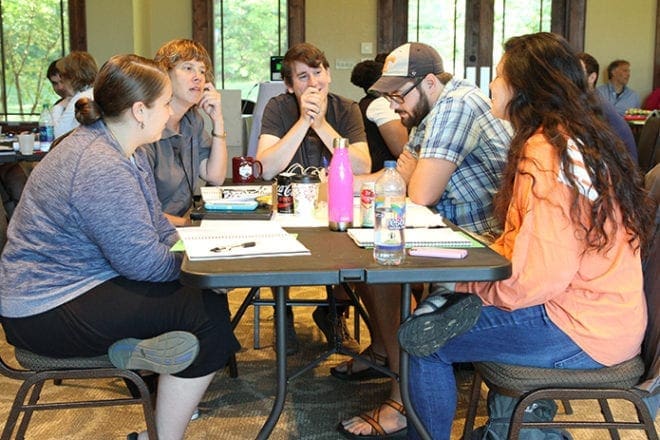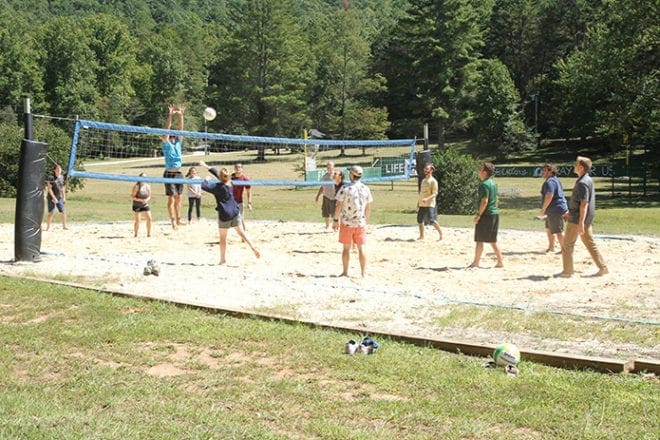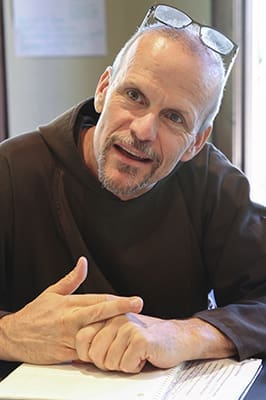Angela O’Donoghue, left, the youth minister at Our Lady of the Assumption Church, Atlanta, and Dawn Eagan, the middle school youth minister at St. Francis of Assisi Church, Raleigh, N.C., participate in an opening mixer Sept. 21 in order to get to know other youth ministers on hand for the 2016 Institute for Catholic Youth Ministry at Covecrest in Tiger. Photo By Michael Alexander
Tiger
Leaders in youth ministry come to north Georgia for national institute
By NICHOLE GOLDEN, Staff Writer | Published October 20, 2016
TIGER—Youth ministers from across Georgia and the nation came together for a team huddle at the Institute for Catholic Youth Ministry held Sept. 19-22 at Camp Covecrest in Tiger.
The youth ministers gathered at the mountaintop camp to hear what their counterparts are doing and to learn from national leaders in youth ministry. It was the first time the institute was held in this archdiocese. Archbishop Wilton D. Gregory celebrated the opening Mass Sept. 19.

(Clockwise, from left) Sarah Taylor, youth minister at St. James Church, Conway, S.C., Cindy Caughman, youth minister at St. Thomas Aquinas Church, Alpharetta, David Burkemper, youth minister at St. Joseph Church, Tontitown, Ark., Jesse Butrum, youth minister at All Saints Church, Dunwoody, and Jessica Williams, middle school youth minister at St. Jude the Apostle Church, Sandy Springs, discuss a ministry-related topic during a morning session of the 2016 Institute for Catholic Youth Ministry. Photo By Michael Alexander
Organized by the archdiocesan Office of Formation and Discipleship and by Cultivation Ministries, a nonprofit emphasizing training in this ministry, the institute served to help youth ministers plan for growth, evaluate practices, and address trouble spots.
Katherine Angulo, associate director of youth ministry for the archdiocese, said 46 youth leaders attended, primarily those in Georgia and metro Atlanta, but some from as far away as Arizona and Wyoming.
“For sure, we’ll do it again,” said Angulo about a repeat offering. “The talent in this room is amazing.”
Speakers were Frank Mercadante, executive director of Cultivation Ministries; Kim McMillan, a youth minister from Elmwood Park, Illinois; Bob McCarty, executive director of the National Federation for Catholic Youth Ministry; Ela Milewski, associate director of Cultivation Ministries; and Mike Patin, author and self-described “faith horticulturalist.”
See and meet deeper needs
In a session Sept. 21, Milewski presented “Prepare, Reap, Sow and Grow” in Mary’s Chapel at Covecrest.
An experienced youth minister, Milewski became project coordinator of the National Initiative on Adolescent Catechesis while pursuing her doctorate at the Catholic University of America. She spoke about fostering relationships.
“Programs should always be people-centered,” Milewski told the youth ministers.
She also encouraged development of programs that are strategic in nature.
When she asked how many youth group leaders had backgrounds in education, many hands went up. Milewski suggested that youth ministers keep an ISP or individual spiritual plan for each teen, similar to the IEP or individual education plan for special needs students used in public schools.
The plan would ask, “What does this kid need from us?” she said, and would outline how to respond.
She encouraged participants to design their programs to be evangelizing.
Most youth need to hear the Gospel message multiple times and in many ways in order to respond, she said.

After lunch some of the youth ministers take to Covecrest’s sand-filled volleyball court, where they have some fun before the afternoon workshop session begins. Photo By Michael Alexander
Youth ministry should be about having fun and building relationships. This invites teens to a closer relationship with Jesus.
Milewski covered perceived and unperceived needs of youth or the reasons behind their participation. Perceived needs include faith, food and fun, “and you have to meet them,” she said.
Unperceived needs may be that some need help with a problem or are there only because their parents insisted they come.
“When we’re strategic, we can meet those unperceived needs,” she said.
On a large scale, needs might be met with fun youth nights. Small community groups, retreats or service days meet other needs.
“Service is almost the new way of evangelizing people,” she suggested.
Milewski said an excellent guide for youth catechists is St. John Paul II’s exhortation, “Catechesis in Our Time.”
She encouraged participants to be open-minded in listening to kids who challenge things, as well as to offer a program that doesn’t feel like school.
Friar works in family ministry
Father Thomas McNamara, a Capuchin Franciscan, attended the institute. He is chaplain for Capuchin Youth & Family Ministries in Garrison, New York, on the banks of the Hudson River.
Father McNamara said that being surrounded by nature helps one to “let go of where you were.” He said the Capuchin retreat center is very similar to Covecrest in setting.

Capuchin Franciscan Father Thomas McNamara, the chaplain for the Youth and Family Ministries, Garrison N.Y., was one of 47 youth ministers on hand for the 2016 Institute for Catholic Youth Ministry at Covecrest in Tiger. Photo By Michael Alexander
The Capuchin Youth & Family Ministries Center supports parish youth ministries, as well as individuals and small groups. They provide Day-by-Day Agape retreats, leadership training, women’s faith and sharing retreats, and confirmation retreats.
“This fall, we’re going to do a family service retreat,” said Father McNamara. The retreat will be for families who have special needs children and will enable them to participate.
Parish youth groups in that region, he said, have “dropped off the map.” Any new youth groups forming are typically the result of the closing and merging of parishes.
Father McNamara called the institute good enrichment for those who want to work with youth. He will carry what he learned back to the Capuchins.
“I can take this and talk about what’s our next step,” he said.
While the ministers are working with fewer youth, the teens who participate are serious about their faith.
“They are looking to find meaning,” he said.
The friars are assisted by the Caps Corps, a group of college graduates who serve as full-time volunteers, sharing prayer and simple living for one year. They run weekly parish youth groups and facilitate outreach programs.
“We’re trying to create new communities,” he said.
Father McNamara decided to attend the Georgia event because Mercadante, a presenter, authored one of his favorite books, “Engaging a New Generation.” At the institute, the priest picked up tips, new acronyms, and enjoyed hearing the funny things that happen to other youth ministers.
“It’s inspiring to see what motivates them,” he said.
Since attending, he’s also learning more about the Catholic Parent Revival initiative or CPR.
“The people that really need catechesis are parents,” he agreed.
“The adults have to see the need” for their children to spend time growing in faith.
Life is busy and children are booked with sports, investigating colleges, and connecting with each other. But in 100 years, said Father McNamara, none of those things will mean anything.
“All of it’s going to dust,” he said.
Hunger for Christ
Lunch mates Paulette Flench of Conway, South Carolina, and Kari Beth Paulk of Phoenix enjoyed the time at Covecrest.
Paulk, a native Georgian who is youth minister at St. Thomas More Church in Glendale, Arizona, said it was the “most pertinent” of several retreats she’s attended recently.
She said it was the program speakers who made the three-and-a-half-day retreat so valuable.
“It’s absolutely their personal experiences and their genuine want” to bring others to Christ, she said.
Flench said she would attend the program again.
“They are experts, yet it doesn’t feel like an ego trip. I am coming away with practical tools,” she said.
Technology has changed a generation and is something youth ministers have to address. Despite contact available at their fingertips, youth are “still longing for a personal encounter and a personal relationship with Christ,” said Paulk.
Using social media can be a tool to reel youth in, “but we don’t want it to be a substitute,” said Flench.
Both enjoyed the beauty of the outdoors at Covecrest, tucked away in rural Rabun County.
“The campus is very beautiful,” said Paulk. “Getting here was a pilgrimage. God has placed me here on purpose.”
Covecrest is one of three Life Teen Camps in the country and has a resident community supporting retreats held there for parishes, schools, ministries and community groups. For more information visit http://lifeteen.com/camps/camp-covecrest/.